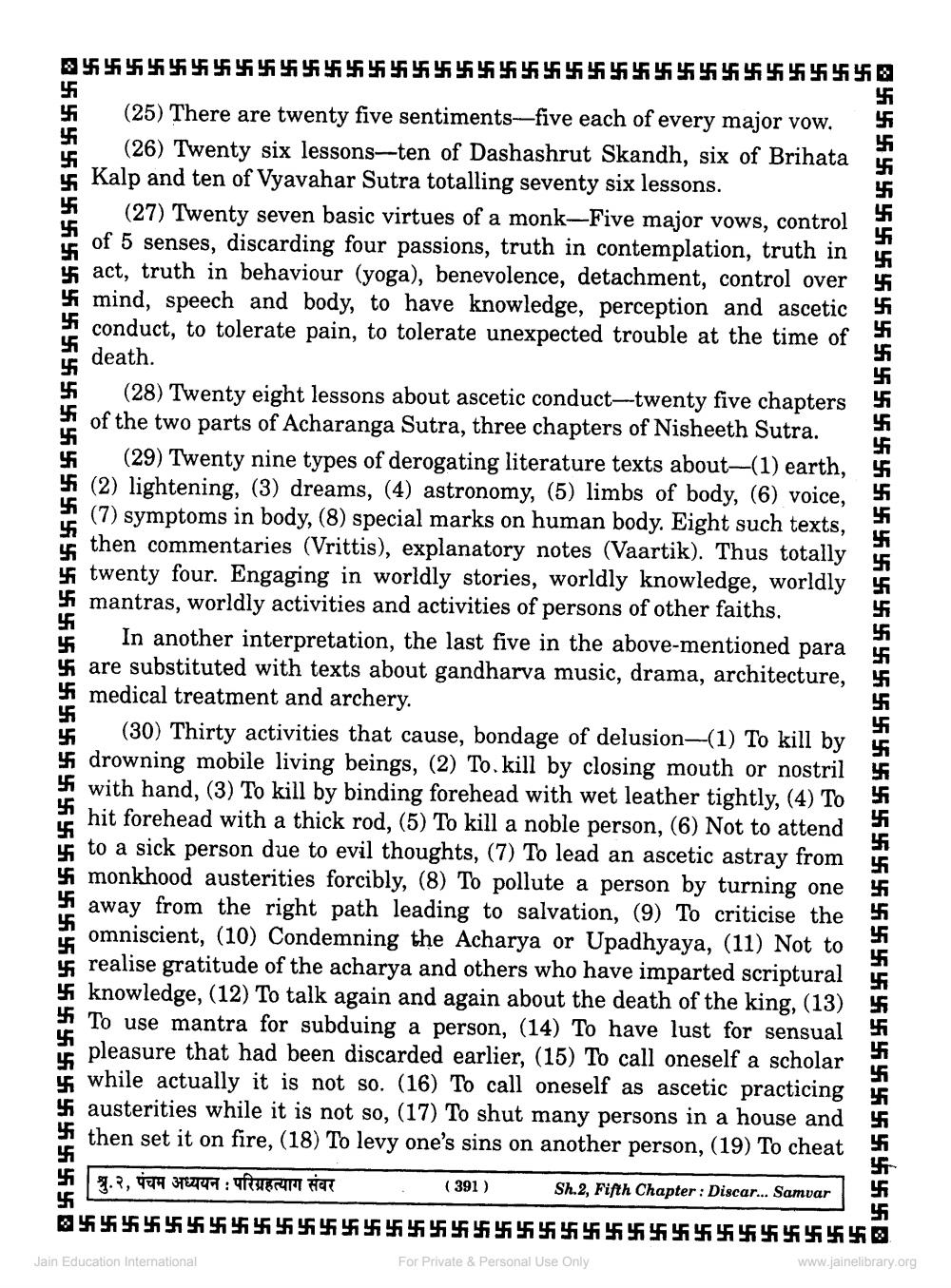________________
25545555 $$$$$$$454545454545454545454545454545454141414141414142
454
441 44 46
457 455 456 457 455 456 457 458 459 460 461
456 457 455 456 457 455 456 457 455 456 455 456 457 455
4 (25) There are twenty five sentiments-five each of every major vow.
(26) Twenty six lessons-ten of Dashashrut Skandh, six of Brihata - Kalp and ten of Vyavahar Sutra totalling seventy six lessons.
(27) Twenty seven basic virtues of a monk-Five major vows, control of 5 senses, discarding four passions, truth in contemplation, truth in 11 act, truth in behaviour (yoga), benevolence, detachment, control over 4i mind, speech and body, to have knowledge, perception and ascetic
conduct, to tolerate pain, to tolerate unexpected trouble at the time of death.
(28) Twenty eight lessons about ascetic conduct-twenty five chapters of the two parts of Acharanga Sutra, three chapters of Nisheeth Sutra. 4 (29) Twenty nine types of derogating literature texts about–(1) earth, $i (2) lightening, (3) dreams, (4) astronomy, (5) limbs of body, (6) voice,
(7) symptoms in body, (8) special marks on human body. Eight such texts,
then commentaries (Vrittis), explanatory notes (Vaartik). Thus totally 4 twenty four. Engaging in worldly stories, worldly knowledge, worldly mantras, worldly activities and activities of persons of other faiths.
In another interpretation, the last five in the above-mentioned para 4 are substituted with texts about gandharva music, drama, architecture, si medical treatment and archery. 4 (30) Thirty activities that cause, bondage of delusion—(1) To kill by 41 drowning mobile living beings, (2) To kill by closing mouth or nostril
with hand, (3) To kill by binding forehead with wet leather tightly, (4) To
hit forehead with a thick rod, (5) To kill a noble person, (6) Not to attend 5 to a sick person due to evil thoughts, (7) To lead an ascetic astray from 4 monkhood austerities forcibly, (8) To pollute a person by turning one Si away from the right path leading to salvation, (9) To criticise the
omniscient, (10) Condemning the Acharya or Upadhyaya, (11) Not to
realise gratitude of the acharya and others who have imparted scriptural 41 knowledge, (12) To talk again and again about the death of the king, (13)
To use mantra for subduing a person, (14) To have lust for sensua
pleasure that had been discarded earlier. (15) To call oneself a scholar 5 while actually it is not so. (16) To call oneself as ascetic practicing 41 austerities while it is not so, (17) To shut many persons in a house and
then set it on fire, (18) To levy one's sins on another person, (19) To cheat
455 456 457 455 456 457 455
4
4
4
4
46
4
4
4
56 457 45
4
4
14
155 156
4
454 455 456 457 454 455 456 457 4
15
1 4
श्रु.२, पंचम अध्ययन : परिग्रहत्याग संवर
Sh.2, Fifth Chapter: Discar... Samvar
555554545454545454545454545454545454545454545454545454545454545454545 Jain Education International For Private & Personal Use Only
www.jainelibrary.org




